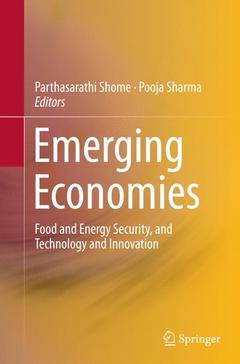Description
Emerging Economies, 2015
Food and Energy Security, and Technology and Innovation
Language: English
Subjects for Emerging Economies:
Publication date: 10-2016
Support: Print on demand
Publication date: 03-2015
428 p. · 15.5x23.5 cm · Hardback
Description
/li>Contents
/li>Biography
/li>Comment
/li>
This volume brings together research on development in three major areas of contemporary global relevance: agriculture and food security, energy, and the institutions of national innovation. Covering six of the largest emerging and developing economies (EDEs) in the world, three Asian (China, India and Malaysia), two Latin American (Brazil and Mexico), and one African (South Africa), the book offers insights on how the major EDEs have addressed the complex and increasingly interrelated issues of agricultural growth, food security and access to energy as part of their growth and development experience over the last three decades. Underscoring the broader view of institutions of national innovation capacities, the volume presents the role of domestic policy and macroeconomic fluctuations in shaping the innovation capacities and development policy in these countries.
The book is divided into three main parts. Part I addresses agriculture and food security, while Part II focuses on the energy sector, including the importance of clean energy and energy efficiency in improving access. Parts I and II also cover the role of the major sector-specific innovations for increasing productivity and growth. Subsequently, Part III examines the importance of economy-wide institutions of innovation in the context of supporting growth and development.
Dr. Parthasarathi Shome is Chairman, Tax Administration Reform Commission (TARC), Government of India, from August 2013. He was Adviser to the Indian Finance Minister, 2012-14. Earlier, he was Director and Chief Executive, Indian Council for Research on International Economic Relations (ICRIER), New Delhi, 2011–12. Prior to that, he was Chief Economist, Her Majesty’s Revenue & Customs (HMRC), UK, 2008–11 and Adviser to the Indian Finance Minister, 2004–08. He has been Member, Prime Minister’s Trade & Economic Relations Committee, and Permanent Invitee, Empowered Committee of State Finance Ministers for VAT and GST. He was Chairman, Tax Policy and Tax Administration Advisory Group, India’s Tenth Five Year Plan (2000-01), as well as Ninth Plan (1996-97). From 1999 to 2001, he was Reserve Bank of India Chair Professor, ICRIER, and Director, National Institute of Public Finance and Policy, 1995-97. Between 1983-2004, he served in various positions at the IMF, including Director, IMF Regional Training Institute, Singapore, 1999-2001. He began his professional career at American University, Washington DC, 1975-83, where he rose to be Professor. He has authored, edited and co-edited books including Taxation Principles and Applications: A Compendium, LexisNexis, Indian Tax Administration: A Dialogue, Orient Blackswan, The G20 Macroeconomic Agenda - India and the Emerging Economies, Cambridge University Press, Tax Shastra: Administrative Reforms in India, United Kingdom and Brazil, Business Standard Book, Tax Policy and Administration in South and South East Asia, Routledge, India’s Fiscal Matters, Oxford University Press, Tax Policy Handbook, IMF, among others, and has over 50 refereed articles in journals including Journal of Economic Theory, Oxford Economic Papers, Oxford Review of Economic Policy, IMF Staff Papers, Journal of PublicEconomics, National Tax Jour




